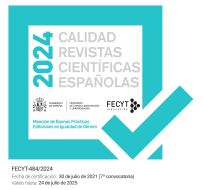Illustrated aesthetic, class discourses and music education in schools in the early Twentieth century
DOI:
https://doi.org/10.5944/hme.5.2017.16719Keywords:
Illustrated aesthetic, Class discourses, School music education, Twentieth century, «Serious music»Abstract
The Concept of «serious music» has been subject to kinds of representations, especially since the Renaissance, which conditioned and continue to condition approaches to musical education as well as the socio-cultural constructions deriving from them. Thus, the underlying discourses regarding this notion of «music» still prevailed even with the notable innovations introduced in the early twentieth century in the area of music education, innovations which also had a major impact on the methodologies used in music class. Based on these considerations, we attempt to offer an approximation to the processes that, during the late nineteenth and early twentieth centuries, tended to support the idea of «serious music» while we also examine the influence they had on school educational history
Downloads
References
Baricco, Alessandro. El alma de Hegel y las vacas de Wisconsin. Madrid: Siruela, 1999.
Blacking, John. ¿Hay música en el hombre?. Madrid: Alianza, 2006.
Bolaño Amigo, María Eugenia. «Estética ilustrada musical e intereses ideológicos. Preservación de la idea de música culta a comienzos del siglo XX, clases sociales y educación». In Actas del XVIII Coloquio de Historia de la Educación. Arte, literatura y educación, edited by Núria Padrós, Eulàlia Collelldemont, and Joan Soler. Vic: Universitat de Vic-Universitat Central de Catalunya, 2015.
Bourdieu, Pierre. Distinction: A social critique of the judgement of taste. Cambridge: Harvard University Press, 1984.
Burkholder, Peter, Donald Grout, and Claude Palisca. Historia de la música occidental. Madrid: Alianza Editorial, 2008.
Capel, Horacio, José María López, and José Tomás Pardo. «Ciencia e ideología en la ciudad». Vol.II. In I Coloquio interdepartamental. Valencia: Generalitat valenciana, Conselleria d’Obres Públiques, Urbanisme i Transports, 1992.
Cook, Nicholas. De Madonna al Canto Gregoriano. Una muy breve introducción a la música. Madrid: Alianza Editorial, 2001.
Costa Rico, Antón. «Modelos pedagóxicos, códigos curriculares e sociedades en perspectiva histórica». In A Educação Escolar em Perspectiva Històrica, edited by Miguel Blanck and Teixeira Corrêa, 7-78. Brasil: Autores Asociados, 2005.
Digón Regueiro, Patricia. «Género y música». Música y Educación: Revista trimestral de pedagogía musical 13 (41) (2000): 29-54.
Dufour, Michèle. «El idioma romántico de la música absoluta. En torno a Beethoven». In Musyca. Música, sociedad y creatividad artística, edited by Javier Noya, Fernán Val, and Martín Pérez, 193-209. Madrid: Biblioteca Nueva, 2010.
Flores, Susana. «Sociedad, cultura y educación musical». In Música, complementos de formación disciplinar, edited by Andrea Giráldez, 9-34. Barcelona: Graó, 2010.
Fubini, Enrico. La estética musical desde la Antigüedad hasta el siglo XIX . Madrid: Editorial Alianza Música, 2010.
Green, Lucy. Música, género y educación. Madrid: Morata, 2001.
Hemsy de Gainza, Violeta. «La educación musical en el siglo XX». Revista musical chilena 58 (201) (2004): 74-81.
Hormigos Ruiz, Jaime. Música y sociedad. Análisis sociológico de la cultura musical de la posmodernidad. Madrid: Fundación Autor, 2008.
Lamb, Roberta, Lori-Anne Dolloff, and Sandra W. Howe. «Feminism, Feminist Research and Gender Research in Music Education». In The new handbook of research for music teaching and learning, edited by Colwell and Richardson, 648-674. New York: Oxford University Press, 2002.
Loizaga Cano, María. «Los estudios de Género en la Educación Musical». Revisión Crítica. Musiker 14 (2005): 159-172.
Martí, Josep. Más allá del arte. La música como generadora de realidades sociales. Barcelona: Deriva, 2000.
Sarget Ros, María Ángeles. «Perspectiva histórica de la educación musical». Ensayos: Revista de la Facultad de Educación de Albacete 15 (2000): 117- 132.
Valles del Pozo, María José. «La educación musical en la historia de occidente: Apuntes para la reflexión». Neuma: Revista de Música y Docencia Musical 1 (2009): 218- 232.
Downloads
Published
How to Cite
Issue
Section
License
Authors who publish in Historia y Memoria de la Educación agree to the following terms:
- Authors retain copyright and grant the journal right of first publication with the work simultaneously licensed under a Creative Commons Attribution-NonCommercial 4.0 International that allows others to share the work with an acknowledgement of the work's authorship and initial publication in this journal.
- Authors are able to enter into separate, additional contractual arrangements for the non-exclusive distribution of the journal's published version of the work (e.g., post it to an institutional repository or publish it in a book), with an acknowledgement of its initial publication in this journal.
- Authors are permitted and encouraged to post their work online (e.g., in institutional repositories or on their website) prior to and during the submission process, as it can lead to productive exchanges, as well as earlier and greater citation of published work (See The Effect of Open Access).










